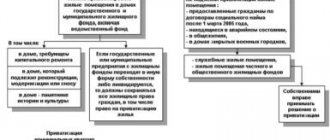In order to declare a real estate privatization transaction invalid, it is necessary to contact the judicial authority with the appropriate statement of claim.
Dear readers! The article talks about typical ways to resolve legal issues, but each case is individual. If you want to find out how to solve your particular problem , contact a consultant:
8 (800) 700 95 53
APPLICATIONS AND CALLS ARE ACCEPTED 24/7 and 7 days a week.
It's fast and FREE !
In order to minimize the risks of receiving a refusal from the court, you need to know about some important nuances.
Invalid transaction
To be able to cancel privatization, it is necessary to prove the invalidity of the transaction. These include all transactions without exception that are contrary to Russian legislation.
The legislation of the Russian Federation provides for several types of such transactions:
- Insignificant. In other words, the transaction is declared invalid from the period of its completion, regardless of whether the fact was revealed or not.
- Contestable. The fact of invalidity is determined by a judicial authority at the request of someone.
The only difference is that insignificant privatization is considered such under Russian law. In the second situation, the final word remains with the judiciary.
Speaking about the consequences that apply to invalid transactions, after this fact has been established by the judicial authority, in most cases restitution is used - the return of relations to the situation before the initiation of the procedure.
In such a situation, the procedure, without exception, is subject to return to the previous owners, namely:
- property;
- cash and so on.
Often everything is returned to only one party or is completely subject to confiscation in favor of the state. However, this is only possible when the transaction has very dangerous consequences for society. The possibility of monetary compensation is also allowed if it is revealed that damage has been caused to one of the parties.
Documents for going to court
The main document for filing a claim is an application. Without it, the court will not be able to open a case, conduct an investigation and render a verdict. In addition to the written application, the plaintiff must provide an additional list of documents:
- Identity document of the plaintiff.
- A certificate proving the plaintiff's incapacity. Necessary as evidence that the actions on the part of the defendant were unlawful. A certificate of disability, if available, is also suitable.
- Receipts and bank statements, if the plaintiff participated in privatization, paid expenses, but for some reason he was not included in the total number of registered owners.
- Birth certificate of children who did not participate in the registration of rights, but their rights were infringed and violated.
- Receipt for payment of state duty in the amount of 300 rubles.
- Cadastral and technical plan for the disputed property (if any).
- Legal documents that will help prove the plaintiff’s involvement in privatization. For example, a social rental agreement that was issued by a municipal or state service.
Arbitrage practice
In judicial practice, there is a list of the main reasons for the plaintiff to go to court. These include:
- the privatization agreement was signed by a minor. Despite the fact that, by law, children over 14 years of age have the right to familiarize themselves with contracts, study the legal side of the transaction and sign a document, the entire procedure must be carried out under the supervision of a legal representative. In this case, the parent or guardian is obliged to certify the child’s signature with his own signature;
- the privatization agreement was signed under pressure, using force, threats and damage to property;
- If there are minor children in the family, then to privatize the living space it is necessary to obtain permission from the guardianship authorities. The State Child Protection Service will monitor the entire procedure in order to protect the rights of minors.
There is only one conclusion: in 90% of all cases, the filing of a statement of claim is caused by the personal hostility of third parties towards the participants in the privatization. At the same time, you need to understand that all claims are carefully analyzed and, if a violation of the rights of the plaintiff or representative is discovered, the transaction will be recognized not only as invalid, but also void. This means that no one will be able to challenge the completed registration procedure until all violations are eliminated.
The legislative framework
The main legislative acts on the issue under consideration are considered to be:
- Federal Law No. 1541-1, which displays the requirements for the possibility of taking part in the procedure.
- The Civil Code of the Russian Federation, which displays the rules for confirming privatization as invalid, also describes the consequences.
- Federal Law No. 218 - reflects the execution of the act of recognizing the investigation as invalid.
It is these legislative acts that must be emphasized in order to invalidate a transaction.
Changing the situation
The applicant's circumstances
The limitation period may be increased if the applicant has objective circumstances:
- Treatment of a serious illness,
- Helpless situation
- Severe psychological state due to the death of a loved one,
- Caring for sick family members or relatives,
- Serving in the armed forces and so on.
IMPORTANT, these circumstances can be taken into account by the court, provided that they occurred during the last six months of the limitation period and do not exceed it in duration, and if there are documents confirming these circumstances.
In order for the court to take into account circumstances that did not make it possible to meet the allotted limitation period, a separate application must be submitted, which requires indicating the circumstances of obtaining information about the fact of privatization, as well as the reasons that did not allow learning about this fact earlier. The application must be accompanied by documents that confirm the facts described in it.
The expiration of the statute of limitations does not mean that a citizen will not be able to protect his interests in court, it only means that the actions and circumstances of other interested parties will be taken into account when making a decision. In any case, the deadline for filing claims on privatization issues is limited to 10 years.
It is the responsibility of the plaintiff to prove the fact of illegality or invalidity of the privatization transaction. The evidence base can be official documents, certificates, court decisions.
Important nuances of filing a claim to invalidate privatization
- Only an established circle of persons can file a claim (citizens whose interests and rights were not respected at the time of privatization, the municipality, as the former owner of the privatized apartment, or supervisory government bodies),
- Disputes regarding privatization issues are considered in courts of general jurisdiction,
- In case of disputes regarding the cancellation or change of privatization conditions, there is no claim stage,
- When filing a claim regarding the cancellation or change of privatization conditions, an important condition is compliance with the statute of limitations. Court decision challenging a privatization transaction.
As a result of the consideration of the case, one of the following decisions on the claim may be made:
- Termination of the privatization agreement, return of the apartment to the ownership of the municipality, and citizens receiving the status of tenants under a social tenancy agreement.
- Changing the terms of the privatization agreement - including in it persons who were previously illegally deprived of the right to privatize an apartment, as a result, redistribution of ownership shares in real estate.
- Changing the terms of the privatization agreement means excluding from the participants in the transaction citizens who received the right to privatize illegally, as a result, a redistribution of ownership shares in the apartment in the direction of increasing them for the remaining participants in the transaction.
Based on a court decision, the Rosreestr branch carries out re-registration of property rights to real estate.
IMPORTANT: in the event of a transaction being declared invalid, citizens who participated in the transaction retain the right to re-privatization on a general basis
Invalidation of privatization
Recognizing privatization as invalid requires compliance with a certain mechanism of action and nuances. In order to be able to protect your rights, we will consider the mechanism in more detail.
Reasons
An agreement to transfer property into private hands can be declared invalid through a judicial authority only if:
- when it was signed, the rights of minor children and other citizens were violated;
- the citizens who signed the agreement were incompetent or minors for this period;
- citizens did not privatize property voluntarily, or became victims of fraudsters, were misled, and so on.
These conditions are grounds for invalidating privatization.
Presence of minor children
The participation of minor children in privatization is quite possible. Often, due to ignorance of Russian legislation, parents come to the conclusion that the procedure needs to be appealed to a judicial authority and declared invalid.
This is allowed in the following cases:
- minor children are excluded from the procedure without prior permission from the guardianship and trusteeship authorities;
- the contract bears the signature of a child under 14 years of age;
- the agreement was signed by children aged 14 to 18 years, but without prior parental permission.
Please note: actions directed against children regarding the issue of obtaining a share in an apartment at the place of residence are illegal, and this is grounds for invalidating the transaction.
In 2020, this rule also applies to citizens who are recognized as legally incompetent under Russian law.
Repeated participation
Based on Russian legislation, the right to privatize any type of real estate can be used by adult citizens only once in their life.
Repeated participation is strictly prohibited.
Based on this, upon repeated participation, the transaction is considered void. Real estate obtained in this way must be returned to the state or municipality. The violation does not apply to those citizens who previously refused to take part in the transaction on their own initiative.
The period when you can use your right is limited only by the provisions of Russian legislation.
Incapacitated persons
Some mental illnesses can lead to the fact that relatives, in order to protect themselves from various actions of a person, ask the court to declare him incompetent.
All transactions without exception, including privatization, are considered void. From these types of transactions is the one that was carried out by an adult with limited legal capacity.
In most cases, this is done with those who suffer from alcohol or drug addiction.
Without exception, all legally significant transactions are subject to appeal, if permission to carry them out has not been obtained from the trustee.
Temporarily deregistered
Based on the Federal Law “On Privatization,” only citizens who are registered in the property at the time of privatization can take part in the procedure.
In addition to them, there is a list of citizens who have the right to privatization without the necessary registration:
- military citizens;
- persons who are in prison.
Due to their absence and deregistration on a temporary basis, the right to receive part of the real estate remains with them.
Misconception
It is very difficult to prove that the person who signed the agreement was in a state of delusion. This is due to the fact that Russian legislation considers only misconception regarding the subject of the transaction and its consequences to be significant. As for motives, they do not play a serious role.
You can often find another option when, under delusion, citizens, on the contrary, refuse to participate in the privatization procedure.
In this case, there are good chances to defend your position in the judiciary. If the judge finds the arguments convincing, a decision will be made to invalidate the agreement.
After appealing the transaction, the privatization procedure can be initiated.
Find out how to challenge the privatization of an apartment. Is it possible to privatize the land under the garage? See here.
Deception or threats
An additional basis for appealing the result of privatization is coercion to conclude such an agreement:
- by deception;
- as a result of violence, threat to property or life and health.
Despite the obvious illegal behavior of one of the parties, the transaction is not considered void, but directly voidable.
The party that is convinced that rights have been violated has the right to appeal its opinion to a judicial authority. Recognition of such a transaction as invalid has differences from other consequences.
A participant who threatens or deceives will not be able to get his property back. It should go to the benefit of the state.
What claims may there be regarding privatization?
There are dozens of claims to challenge the privatization procedure. As a rule, the main initiators of the refutation and cancellation of the registration of the owner’s rights are the former owners of the living space, who for one reason or another did not know about the completion of this procedure. There are cases when guardianship authorities or local authorities intervene in the privatization process because the rights of children or people with disabilities have been violated.
The main list of claims for challenging privatization:
- A family member who has not previously been notified in writing, and who has not given a notarial refusal or recognition of the absence of claims to the transaction, can challenge the registration of rights. In this case, when there is no written refusal, the homeowners have the right to include the citizen in the gratuitous transfer agreement without the knowledge of this person.
- Registration of rights may be invalidated if the plaintiff proves falsification of documents when applying to the local administration.
- By law, you cannot participate in double privatization. Cases where the first registration of rights took place in childhood, and the second after adulthood, are excluded. If the applicant conceals this fact, the transaction is cancelled.
- If the rights of minors were violated during the privatization process, then the guardianship authorities, as well as the closest relatives, who will confirm the fact of violation of the children’s rights, can challenge the transaction.
- Privatization should not be carried out under pressure, force or threats. This procedure is voluntary and not mandatory.
- Registration of rights will be invalid if the court finds that one of the family members was incapacitated at the time of refusal. For example, he was under the influence of alcohol or drugs.
Procedure
To be able to invalidate an agreement, a certain mechanism of action must be followed.
Initially, it is necessary to make sure that there was a violation of Russian legislation or someone else’s rights. This can be done by consulting with a qualified attorney.
Going to court
The second stage is to contact the judicial authority, since it is within its competence to confirm the legality or invalidity of the transaction and decide on the consequences that will be applicable.
This is especially true when it comes to voidable transactions, where only a court ruling matters.
Documentation
In addition to the statement of claim, you must additionally attach:
- passport + copies of completed pages of the claim;
- evidentiary documentation;
- a certificate regarding the presence of incapacity or limited abilities - if available;
- receipts confirming all expenses incurred;
- birth certificate of minor children - if available;
- a certificate from the Federal Migration Service confirming registration;
- title documents for living space.
Depending on each specific case, the list of documents may expand.
Sample claim
The statement of claim regarding the recognition of the agreement and the result of privatization as invalid must be prepared in writing.
The standard requirements of Russian legislation apply to it.
the statement of claim can be found here.
The essence of the limitation period
The Civil Code (Article No. 195) states that the limitation period is the period allocated by the state for going to court and protecting one’s violated rights. If we approach this issue from a legal point of view, then the claim will be nothing more than a way to protect one’s interests on any issue. As a rule, such terms vary depending on the situation, but the law applies to any citizen located in the country.
The main essence of the limitation period:
- in jurisprudence, such a period is an elastic concept, because the legislation does not have a specific time frame for resolving conflict issues. At the same time, there are certain periods during which going to court to defend one’s point of view will not only be relevant, but also legal;
- the limitation period may be suspended and terminated. For example, if during the entire period of limitation, amendments were introduced to the bill that protected the rights of the plaintiff in one way or another;
- statutes of limitations were created in order to speed up the process of resolving conflict situations. Let's give an example: a family decided to privatize a room in a communal apartment, but the neighboring owners were against this procedure. According to the law, the approval of neighbors is not required for privatization, since this procedure is a purely personal matter. At the same time, there is a statute of limitations of 30 days, where neighbors can go to court with a reasoned request to reject the privatization process;
- Despite the fact that the statute of limitations allows you to defend your rights if there was an attempt on the health or life of the plaintiff, in case of violation of his rights, morals and principles, there are situations when this period does not apply. For example, if a case of a threat to life was recorded, the victim can go to court to recover compensation from the defendant within three years. After the expiration of the claim period, the court will not satisfy the claim.
Legal consequences
The main consequences based on Chapter 9 of the Civil Code of the Russian Federation are considered to be:
- forced termination of the transaction;
- return of each party to the initial stage of privatization;
- the property is returned to the rightful owner.
If the fact of damage to property or health was revealed, the party must pay monetary compensation.
Read why privatization of a private house is necessary. What are the rights of minor children when privatizing an apartment? Information here.
How much does it cost to privatize land under a private house? Details in this article.
Arbitrage practice
Judicial practice that has developed in such cases suggests that even in relations between one of the parties, which is the state, you can become a victim not only of exceeding obligations, but also of illegal actions in full.
The solution often adopted is deprivatization.
Here is presented judicial practice on invalidating a privatization agreement.
It is worth noting that, according to statistics, litigation on this issue is only increasing every year.










